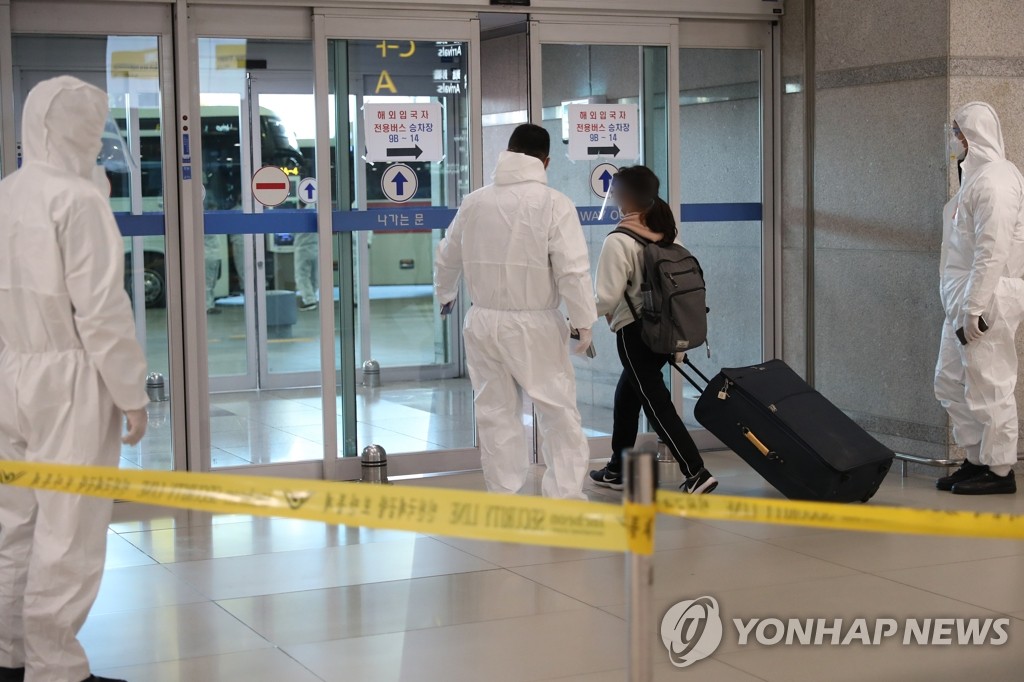- California Assembly OKs highest minimum wage in nation
- S. Korea unveils first graphic cigarette warnings
- US joins with South Korea, Japan in bid to deter North Korea
- LPGA golfer Chun In-gee finally back in action
- S. Korea won’t be top seed in final World Cup qualification round
- US men’s soccer misses 2nd straight Olympics
- US back on track in qualifying with 4-0 win over Guatemala
- High-intensity workout injuries spawn cottage industry
- CDC expands range of Zika mosquitoes into parts of Northeast
- Who knew? ‘The Walking Dead’ is helping families connect
S. Korea brings back airport screening, quarantine measures amid 1st omicron case confirmations

Passengers from Addis Ababa, the capital of Ethiopia, arrive at Incheon International Airport, west of Seoul, on Dec. 1, 2021. (Yonhap)
South Korea decided Wednesday to reimpose strict passenger screening at airports, mandatory quarantine and other measures to prevent the spread of the emerging omicron variant of COVID-19 after reporting the first such cases in the country.
A married couple in their 40s, living in Incheon, west of Seoul, and their friend in his 30s have tested positive for the omicron variant in genetic sequencing tests, the Korea Disease Control and Prevention Agency (KDCA) said.
Two other women in their 50s have also tested positive, the KDCA later added, putting the total confirmed at five. At least one more suspected case was being tested for the variant, along with the tests under way for the family members of the infected patients.
Health officials also conducted the test on the couple’s teenage son, and the result will be announced later this week, the KDCA said.
The couple, who are fully vaccinated, visited Nigeria on Nov. 14-23 and tested positive for COVID-19 last Thursday. Their friend and the son tested positive Tuesday this week. The couple and friend have shown no significant symptoms other than respiratory and muscle pains, according to health officials.
The first confirmed cases of the omicron variant, known to be much more contagious, stoke fresh worries that the spread of the virus could possibly spiral out of control, as the country has lately seen daily caseloads and critically ill patients surge to record highs. Concerns have grown that hospitals may run out of beds.
To block the inflow of the new virus strain, all international arrivals will be required to undergo mandatory quarantine for 10 days for the next two weeks starting Friday, regardless of whether they are vaccinated, the health authorities said after an emergency meeting on virus response measures.
South Korean citizens and foreigners on long-term stay will be allowed to quarantine at home while foreigners on short-term stay will have to be quarantined at a temporary facility designated by the government.
Health authorities will also test all foreign arrivals for the omicron variant if they test positive for COVID-19.
The government added Nigeria to the list of countries whose travelers are effectively banned from entering South Korea, along with eight other African nations, including South Africa, that are already subject to restrictions on visa issuance and arrivals over omicron variant concerns.
For the next two weeks starting Saturday, the government will ban direct flights to and from Ethiopia, reflecting the data that many of the travelers from the nine high-risk African nations flew here aboard planes that took off from its capital of Addis Ababa.
The emergence of the omicron variant has put a damper on South Korea’s full-fledged efforts to return to normalcy with a gradual easing of virus restrictions under the “living with COVID-19″ scheme that began last month.
On Monday, the government decided to put the scheme on hold, saying the pandemic risk level, a new five-tier assessment system it introduced last week to evaluate the degree of COVID-19 risk, has reached the highest level in the country’s capital area.
The government said it will speed up the administration of booster shots and secure more hospital beds over the next four weeks.
But critics call for the authorities to consider going back to reinstating curfews and to tighten entry restrictions from overseas, even for vaccinated travelers, and daily social distancing rules, saying the current measures would do little to contain the spread of the virus.
On Wednesday, South Korea reported 5,123 new COVID-19 cases, surpassing the 5,000 mark for the first time. The number of critically ill patients hit a fresh high of 723.











